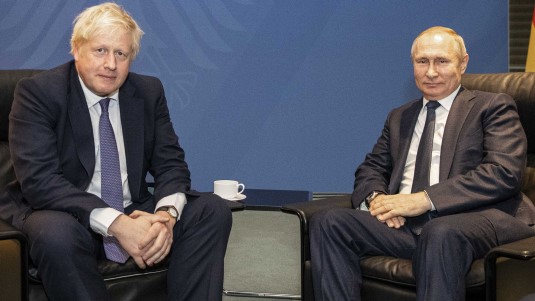Appeasing the Oligarchs

Last week, Boris Johnson talked tough about the Ukraine crisis and threatened all kinds of serious consequences short of military action. The Prime Minister was even happy enough to let Defence Secretary Ben Wallace muse out loud about "Munich" and the "appeasement" efforts of his NATO counterparts. And then in a rambling, chauvinistic, and purposely wrong speech on the history of Ukraine on Monday night, Vladimir Putin announced Russia would be recognising the two breakaway republics and pledged them military assistance.
In reply German Chancellor Olaf Scholz has suspended the Nord Stream 2 pipeline, to some considerable cost and inconvenience to his country. At the behest of the Germans and the French, the European Union have announced sanctions on members of the Russian Duma, 27 named individuals, and restricted access to EU capital markets.
And non-nonsense plain-speaking Britain? Travel bans issued to three oligarchs already sanctioned by Washington, and the freezing of the assets of five minor banks. And that's it. For all the chest beating, Boris Johnson's government have not matched their walk with their talk. The "appeasers" have made their stand, while the Prime Minister opposes Putin with nothing more than a token gesture and a pledge he'll mean it next time.
Attention has been drawn to how compromised the Tory party is by oligarchs' money. When someone else spoke about this four years ago, it was the cue for Labour back benchers to pick up where they left off with their factional war. Considering the influence Putin's cronies have over the Tories via the party's coffers were out of bounds. But now, everybody is doing it. Perhaps even Keir Starmer will go as far to raise it at Prime Minister's Questions. While the penetration of these funds, the details of interests lobbied for and favours granted should be revealed, the Tory enthusiasm for Russian money in more than individual corruption and wrongdoing. It goes to the heart of the party's coalition, its institutional articulation of class interests.
Underneath the mass support, and the particular coalitions of capital supportive of the Tories at any moment, the party owes undying fealty to the City of London. The City is not a singular entity that controls the party, but it does have common interests. These are its continuation as the number one global destination of money seeking quick returns or looking to raise further finance, and all the firms and their individual players have clear interests in ever increasing volumes of trades from which brokerage and handling fees can be extracted. This commercial capital, often misread as finance, is the dominant fraction of British capital. Its personnel constantly circulate from city firms to the Bank of England to the Treasury, and with not a few of them washing up on the Tory benches. Their party, and to a lesser extent Labour, have historically been committed to its pre-eminence. For the Tories, it's the lynchpin of their class power. For others who tell themselves technocratic fairy tales to avoid confronting the class-bound character of the system they manage, it's the goose that lays the golden egg. The health of the City is good for the country because it keeps the taxes coming in, and grants the UK great power status. The rest of these islands can go to the dogs as long as the City remains.
As the premiere clearing house for money, untold billions of looted Russian assets have passed through the City. Some of it went directly into London's overheated property market, others have engaged the services of brokers and hedge fund managers, and some has bought directly into these firms themselves. The panic of the 2008 crash was driven by not knowing the difference between good and bad debt thanks to the investment vehicles cobbled together from mortgages and other obligations. Oligarch capital has spent 30 years sloshing around the City. Finding where it all is, who owns it, and how much of it is essential for the operation of the City is deeply compromising and would expose the corruption at the heart of the "rule of law" in this country. Tough measures against Russian capital also means tough measures against the City, in other words. There is no way Johnson is going to voluntarily sanction the Putin regime and its hangers on. He will have to be dragged into it by his American and European allies - as this round of tentative "sanctions" show.
Image Credit